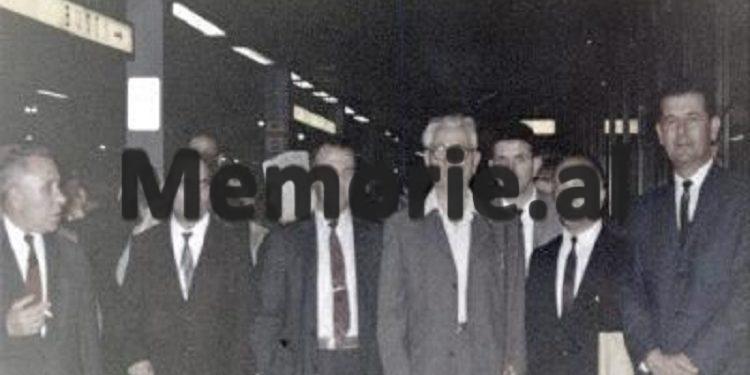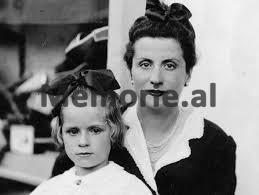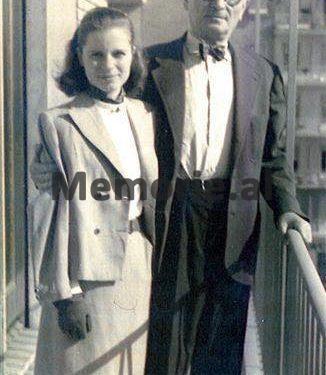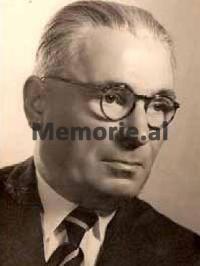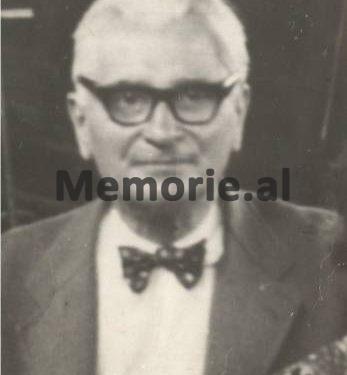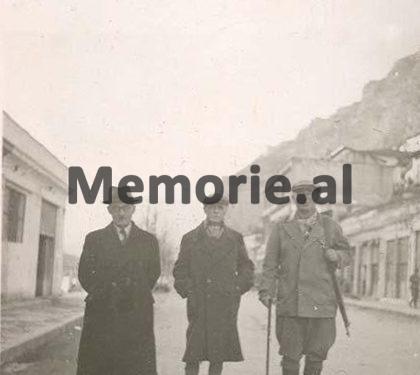By Ani Jaupaj
Second part
Memorie.al / Hana, the daughter of Ali Këlcyra, sentenced to death three times by the government of King Zog and by the dictatorship of Enver Hoxha, one of the founders of the “National Front”, recounts her life and that of her family. Since the birth in Paris, the constant journeys from one country to another, the ties with her father and the worry that she did not manage to create a family of her own. On the road, Hana walks alongside Këlcyra, she apologizes for not being able to walk on the right side. “Excuse me, why do the little ones always have to sit on the left side when the second one walks, but I’ve been used to it since I was little and I can’t change it.”
More than an instinctive habit, I didn’t know how to explain it all, but Hana had it. “When I was little and I walked with my father on the street, I was always on his left side. Because he was threatened with death, he always wanted to have his right side, and thus his right hand, free. There are few years that I have walked by his side, compared to the rest of my life, but I haven’t been able to change it.”
Continues from the previous issue
Ms. Hana, you have moved away from your family again with the advent of communism…?
The escape of 1944 was a story in itself, there were three stages, the escape from Këlcyra, Fieri, and then from Tirana. It all lasted a year, which was painful, because we became more and more depressed after each departure. We didn’t know if we would go back or not.
At the end of 1944, in Shkodër, following the communist advance towards the north, the leaders of the National Front, but also of other nationalist political groups, gathered in Shkodër.
Making practical decisions was difficult; While, according to the words, the Anglo-American landing on our coast was expected, when the contacts with the British missionaries were interrupted, the days passed and the partisan forces approached Shkodra.
Thus, in the absence of an organized military opposition to them, Vehbi Frashëri, the eldest son of Mehdi bey Frashëri, who was never involved in politics, but who had good relations with the Germans, as he had studied in Germany, offering his mediation, to organize our departure with the German military convoys.
The German command, although the “National Front” had fought them for political opportunism (in the context of a subsequent political support from the West, against the establishment of a communist regime), admitted that only the leaders of the “National Front”, for whom the Germans were certain that they had not used weapons against the German soldiers, to leave alongside them, excluding the other soldiers of the “National Front”.
But this proposal is categorically rejected by the leaders of the “National Front”. Then, Vehbi Frashëri, helps us with the possibility of three ships anchored in Tivar, to cross the Adriatic, with the knowledge of the Germans. In this case, the German commander said:
“Although it is dangerous to cross the sea now, because it is mined in many places, it would be better to risk their lives than to fall alive into the hands of communism. We, at least, can save a part of Albanian nationalists”.
So we leave by sea, to Otranto, near the coast 15 km. In the strait, as an unmined place, we decided to cross the sea to Brindizi. In Brindisi, the allies put us in a horse carriage, where I understood for the first time what immigration is. My pain was expressed with endless cries, which annoyed everyone present, Albanians and those who had traveled together towards the freedom of life.
From my cries, my father calms me down. Let’s go out together, ask me why I cried. I answer: “We will never return home”. But my father assures me that in three months we will return to Këlcyre” – and hugs me tightly. From the way he squeezed, I could tell that he loved me very much.
Why did you doubt this?
Yes. Because I remembered the cries of the peasants when I met them, since I was not a boy, and I thought that he might be offended by the lack of the heir of the family. Another reason was the escape from our country.
I felt in love with Këlcyra, but not alone. Meanwhile, I knew my decision, I knew Vlora, Fier, Berat, Kavaja, Elbasan, Tirana, Shkodra and they were wonderful.
What were Ali Këlcyra’s previous relationships with Enver Hoxha, because they had known each other since the latter was a student?
Yes. Enver Hoxha came to console his father when his brother, Faik Këlcyra, died. Meanwhile, another connecting thread was Enver’s brother-in-law, his friend and good friend, Bahri Omari. Some time after my uncle’s death, I was born, and this time Enveri came to congratulate.
He also asked his father, even to become part of the “National Union” organization, after losing the state scholarship for studies in France. The father refused, because this was an organization against the government, which had given him the opportunity to study. I think that this moment may have been the beginning of Hoxha’s hatred towards his father, even though Enveri was not yet involved in Marxist ideas.
Then… how did the move to Vienna happen, where you still live today?
The first secretary of the US Embassy in Rome, Mr. Stevens, of old Albanian origin from Korça, asked his father for a man who knew German, Albanian and English. They ask for my address, but he advises them to contact prof. Ernest Koliqin, who, without knowing anything, addresses them again to me. So I went to Vienna, where I worked as a “desk officer” for Albania, as the work I did there was called; I listened to the news from Albanian radio and translated it.
With the father, what happened in the meantime?
He continued his work until he died on September 24, 1963. His death, at least, was as he wished and had always said: having spent the day in the hills of Rome, he had washed an hour before with cold water, performed all his rituals, and then he had suffered a cerebral hemorrhage.
Since we are in election time, let’s bring something from his campaign time, when he was running for deputy in Gjirokastër…?
Yes, that was his first campaign, when he ran for Gjirokastra. He started from the village of Brezhan i Këlcyra, where he explained for the first time what democracy is and after all the speeches, he asked the participants that; what specific wishes they had that he could present to the Parliament.
The answer was “We want pastures.” The father reminded everyone that the pastures were in front of them, but the listeners replied that; it was about his family’s properties, Këlcyra. At this point, the father declares: “From this moment, these pastures become yours.”
He gave his pastures to the villagers of Brezhan, since as a political formation, he was in favor of agrarian reform and the agricultural development of the country. Later, these pastures were seized by the communist regime, as the property of the Këlcyra family, and returned to me, as their owner.
The father did not register this apology in the cadastre, as the customs of the time were that men keep their word. But even I today, considering my own desire, have refused to take these pastures.
What changes do you see in the Parliament of the two times?
What I know for sure, is that the Parliament was not for my father a field to have and build personal enmity, but to protect the ideas and interests of the country, the Nation. I am bringing you another example: in the case of a law that was introduced in the Parliament by the conservative group, which the father approved in principle, Stavro Vinjau tells him that; no matter how much you are a democrat, you are still in favor of the Beyler proposals.
The father gets angry and shoots him, while the opposition cheers. Not a moment passes and the father picks him up, hugs him and publicly apologizes. Unfortunately, today such an act is inconceivable in the parliamentary debates in Tirana. Even the word ‘sorry’ is no longer used.
Now that you are no longer working, how is your life in Vienna?
I have my own houses, which I consider as children, because I built them myself, with my own hands. One resembles Këlcyra, a miniature Swedish house, the other is like a museum.
Who was Ali Khelcyra?
Ali Këlcyra was born in Këlcyra on May 28, 1891. His uncle, Veli bey Këlcyra, signed the Declaration of Independence. He got his first lessons in his hometown. Attends “Gallata Saraj” high school in Istanbul. He studies at “Mulqije”, high school of political-administrative and economic sciences, Istanbul.
With the outbreak of the first Balkan War, he returns to Këlcyre and the declaration of Independence finds him in the Motherland. During the occupation of the south of Albania by the Greek armies, he left for Vlora.
Greetings to Prince Vidin and Princess Sofia, who came to visit the refugees from the occupied areas. He left his homeland and settled in San Demetrio Korona, near Arbëresh, Italy. In 1915, he continues his studies at the Faculty of Law in Rome, a time when he embraces social-democratic ideas and meets the friend of future battles, Stavro Vinjau. He returns to his homeland a year later and, together with Themistokl Gërmenjin and others, undertakes the initiative of creating the Albanian national squads.
In 1918, he returned again, went to Vlora where, in a secret meeting, the organization called “National Defense” was founded. The Italian command expels him from the territories under its administration. The National Defense Committees already had the goal of organizing an armed war against the Italians, who were here for “protection” from the Greek armies and were stationed around the border.
Participates in the Congress of Lushnja, is elected to the National Assembly as a deputy of the Prefecture of Gjirokastra and already in the first session, proposes that the title “bey” be removed from the appeal of the deputies. The June movement marks his first exile away from his homeland, for 15 years. In 1920, he participated in the Vlora War, which was fought against the Italian occupation.
During the years 1921-1924, he developed an active activity in the political life of the country. From a political point of view, he aligned himself with the democratic wing. While the main leader of the democratic wing, Fan Noli, had the position of the center-left, Ali Këlcyra, revealed the program of the center-right.
Relations between him and Noli began to cool, because Noli approved for the government he formed, a completely center-left program. This program caused Ali to not participate in the “June Government”.
His break with Nolin was legalized by the formation of two parallel parties, one called “National Liberation”, with chairman Fan Nolin, with a center-left program, the other “Bashkimi Kombëtar”, with chairman Sotir Pecin, in which engaged Ali Këlcyra, with a center-right program.
In 1925, the “National Union” organization was founded in Bari, where he was elected to the management committee as its secretary. A year later, the court of political investigations in Tirana issues a “rape letter” against him, to be investigated under the charge of “propaganda against the state, the regime of the President of the Republic”.
In the Official Gazette, the death penalty and property confiscation decision is published. Ali Këlcyra remained in the ranks of the “National Union” until 1938, and even became its main engine. That same year, the “National Union” was dissolved.
During his stay in Paris, Ali Këlcyra reports on the situation in Albania and King Zog’s pro-fascist policy, writing in the dailies “Le Quotidien”, “Le Matin”, etc. When the Albanian Communist Party, founded in November 1941, began to expand, the concerns of right-wing democratic nationalists, of which Ali Këlcyra was a member, grew. In 1939, together with Mehdi Frashër, he is at the head of the Resistance Front, which turns into “Albanian Nationalism-Balli Kombëtar”.
They, right after the Peza Conference, founded the “Balli Kombëtar” organization, the backbone of which was the former leaders of the “Bashkim Kombëtar”. In 1944, from the rostrum of the “National Front” Congress, he once again raised the need to call on the communists to give up the civil war.
At this moment, I throw out the idea of creating a National Front, to face the war on two fronts. In November of that year, together with his family, on a boat, they arrived in Bari and he surrendered with others to the allies. It closes at the “Santa Fara” camp. Memorie.al




